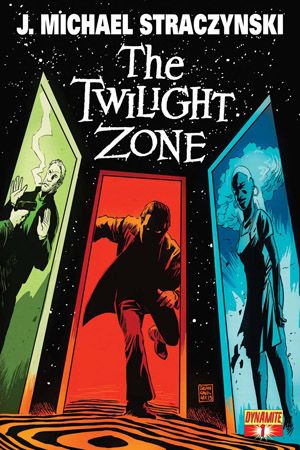"The Twilight Zone" #1 launches the property with a solid but ultimately unsurprising start. The problem isn't with the story from former "The Twilight Zone" television series writer J. Michael Straczynski or the art by Guiu Vilanova who helps launch another former television property after his stint on "Dark Shadows." The problem inherent here is the medium in which this story is being told: comic books.
This is the tale of Wall Street sleaze Trevor Richmond who funnels his entire life's fortune to a secret organization that can completely erase his identity and change his physical appearance to escape being indicted by the Federal Exchange Commission for immoral capitalistic decision making. Straczynski's script is patient, dealing out the necessary information with florid captioning and solid characterization. Readers get to know Trevor well enough to see he's a real bag of dongs that should not get what he wants.
Vilanova's art improves as the story progresses, easing into the characters and what is needed to tell the story. His characters are expressive and his composition is solid. Trevor's girlfriend Natalie has some tragically beautiful reaction shots and the full page reveal of Trevor's new identity is tight and well rendered. Vilius Andrade uses a softer color palate than expected in a tale told by this franchise. There is a lot of white diffusion in the early pages that try to indicate a bright morning but make the story look more like it is taking place in a snow globe.His palate darkens as the tale progresses which is a solid choice.
The main issue here is that this story is a comic book. "The Twilight Zone"is a thinking man's franchise rooted in realism both physical and emotional. Because this is a comic book the concepts and reveals that would leave me in awe as a television show lacked the necessary impact. Television and radio are mediums where the fantastic happens to the ordinary and comic books are a medium where the opposite is true. This inverse effect left me wanting in the end. A cliffhanger ending was disappointing -- "The Twilight Zone's" other storytelling strength was its efficient done-in-one structure and our reintroduction is To Be Continued? Another problem inherent in telling this story as a comic book is a subplot -- here the investigation of CEO Jason Black's son's death. "The Twilight Zone"had a laser-like focus on one story that allowed the show to really dig into the human condition and repercussions of the decisions made by those people therein. If this story wasn't a "Twilight Zone" tale, if this book were called "Douche Banker"or something,I would be less critical -- but having that logo on a gorgeous Francesco Francavilla cover means the bar is set high and there are expectations that exist before the story even starts. I don't know if that is fair or not, but it's the baggage that comes with an existing property adaptation. The book has the strength of its pedigree and a good storytelling team on its side and I'm hopeful that things can only go up from here.

